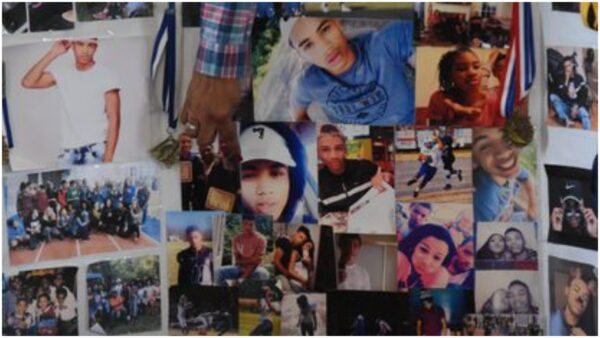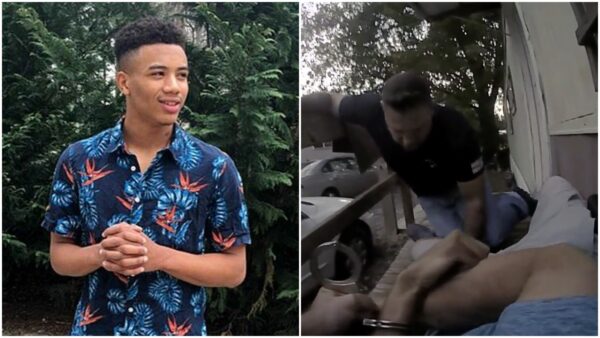A federal judge will allow a grieving family to sue police officers, the state of Maryland, town of Greensboro, members of the Greensboro Police Department, the chief medical examiner, and others for the death of their 19-year-old relative in 2018.
U.S. District Judge Catherine Blake declined to dismiss the lawsuit filed by the family of Anton Black against several parties, including local law enforcement, in what they believe was the wrongful death of the young college student.

The family hopes this is a step to the long journey of securing justice for Anton, a path that started more than three years ago.
On Sept. 15, 2018, Black was killed in police custody in the Eastern Shore city of Greensboro in an encounter initiated by an officer with some 30 use-of-force complaints against him in a previous police position in Delaware, including one where he kicked a handcuffed Black man in the face and knocked out his teeth.
Greensboro Officer Thomas Webster IV — who has since been fired from the department — confronted the young man after someone called 911 about a possible child abduction. Someone saw a Black man with a child in a headlock. However, the concerned caller did not know that it was Black and a young family friend who had been out for a trip to a local basketball court.
Black, who had been hospitalized just days earlier with mental health issues — when he was diagnosed as bipolar — was initially cooperative when he and his 12-year-old friend were called over to the police cruiser by Webster. At some point during their interaction the boy that was allegedly being kidnapped, identified himself as a family friend, contradicting Black’s claim that the two were brothers.

The boy also told the officer that Black was “schizophrenic” and wasn’t acting in his right mind. When Webster told Black to put his hands behind his back both young men took off in different directions.
Webster began pursuing Black, but first he enlisted help from a white motorcyclist who happened upon the scene to join him in the apprehension. During the pursuit two officers from different municipalities, then-Ridgley Police Chief Gary Manos and Centreville police Officer Dennis Lannon, joined Webster’s chase.
Black ran to his family’s trailer and proceeded to get into a car in front of it and lock himself in. Webster took his baton and smashed in the window of the car. After opening the window, he used his stun gun to electrically shock the high school athlete into submission.
As Black continued to struggled with the three cops plus one who wore a Confederate helmet eventually tussled the young man to the base of the family home’s porch and smashed him with their collective body weight for six minutes, and several more minutes after the teen had been handcuffed.
Shackled, the man with “Old Dixie” on his head, held Black’s face to the floor and fixed his legs back towards the sky as his mother helplessly watch. Jennell Black says that the memory of her son being killed in front of her, on her own property, haunts her still.
He struggled to take his last breaths, collapsed after losing consciousness. Police did CPR for nearly 30 minutes, but Anton was pronounced dead at the hospital that same evening.
Over four months after his death, law enforcement released bodycam footage of the encounter, after previously refusing to share the video with the public.
The footage showed the teenager, who had been diagnosed as bipolar, running from cops and later being tased. It also shows the officers detaining him in front of his home, where he cried out to his mother for help and said “I love you,” before he died.
The American Civil Liberties Union of Maryland joined Kenneth Ravenell, René C. Swafford, Leslie Hershfield, and Tomeka Church are representing the family. In 2020, the parties filed a 64-paged federal lawsuit against multiple parties on behalf of Jennell Black, his mother, Antone Black, Katyra Boyce, and the Coalition for Justice for Anton Black.
The claim named over a dozen defendants including the Chief Medical Examiner’s Office and former Chief ME David Fowler.
The attorneys claim the state medical examiner’s office covered up the true causes of the teen’s death resulting in “an unconstitutional police killing.” The claim further alleges the defendants tried to “cover-up involving a decertified officer with a long record of abuse.”
According to the ACLU, Webster has “a documented history of violence and excessive force against Black residents,” even before joining the police force. This is a history that Black had known and mentioned to his mother before the conflict that took his life.”
Still, the Caroline County state’s attorney declined to bring the case before a grand jury, citing the medical examiner’s ruling that the teen’s death was “accidental” from “sudden cardiac death.”
Fowler, who was chief ME at the time of the ruling in Black’s case, achieved national notoriety after testifying on behalf of former Minneapolis cop Derek Chauvin at his murder trial, where Fowler attributed George Floyd’s death to natural causes rather than Chauvin’s knee on his Floyd’s neck.
The state of Maryland has since opened an investigation into Fowler’s apparent pattern of absolving law enforcement officers of culpability for in-custody deaths.
Since the state’s attorney’s refusal, the family has secured a cardiologist from John Hopkins, for a second opinion. The doctor, who will serve as an expert witness for the plaintiffs, states that based on his/ her analysis of Black’s case, he believes the cause of death was not an accidental heart attack, but asphyxiation.
Judge Blake believed that there was enough evidence for the case to be seen and refused to toss it out.
In her 27-page memorandum on the ruling submitted on Tuesday, Jan. 18, she noted that there were too many facts that could be disputed, noting that the bodycam doesn’t answer all of the questions surrounding “the cause(s) of Mr. Black’s death.”
The family applauded the court’s decision saying the “ruling matters so much” to those who cared for the teen. Black’s sister, LaToya Holley, commended the judge for her decision in a statement.
In part, Holley wrote, “This sweeping ruling matters so much to our family and our ongoing struggle to ensure there is accountability for the police who murdered Anton, all those who covered it up, and for the medical examiner who tried to justify it.”
“This ruling gives us some hope in our hearts that accountability will come, and that our lawsuit may ultimately help other families around the country who are also mourning loved ones whose killings by police were also covered up,” she concluded.
More news from our partners:


